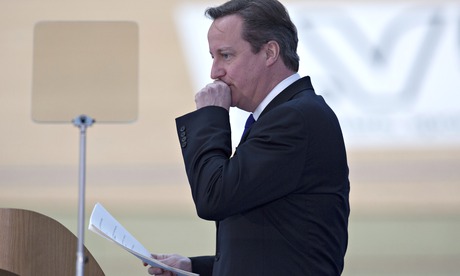
Politicians, cynics like to imagine, publicise their choice of reading as carefully and calculatingly as they do their records on Desert Island Discs. This morning, when David Cameron declared his love of the Edwardian childhood classic Our Island Story, the fact that he did so in the course of a speech on the Scottish referendum may well have caused some to raise their eyebrows. In fact, though, Cameron has form when it comes to eulogising Henrietta Marshall's gloriously sweeping history of Britain. Four years ago, in the same survey that saw Nick Clegg nominate The Gruffalo, he picked it as his all-time favourite children's book. Clearly, then, Our Island Story genuinely does appeal to something in our prime minister's heart.
It is not hard to guess, of course, in the context of the possible break-up of the United Kingdom, what the appeal of Marshall's narrative might be to a Conservative leader. Toryism has its romantic as well as its utilitarian side, and Our Island Story portrays the rise of British institutions as a stirring tale of heroism and triumph. As well as Parliament and freedom under the law, Marshall casts the union of England and Scotland as something almost pre-ordained, and celebrates it with a strain of romanticism that owes much to that most influential of Scottish Tories, Sir Walter Scott. Marshall herself, though, was no Tory. The vision of British history as a progression towards enlightenment and liberty articulated in her book was famously cast by the historian Sir Herbert Butterfield as Whiggish – yet she was no Whig either. As Ted Vallance, the author of A Radical History of Britain, has pointed out, Marshall wrote her book in Australia, a country that by the early 20th century was way in advance of Britain in terms of its democratic fundamentals. Those who have never read Our Island Story should not be deceived by Tory enthusiasm for it into imagining it jingoistic. To read it is to discover what Vallance has aptly described as "the surprising radicalism of this deceptively traditional text".
The keynote of Our Island Story is an enthusiasm for the rights and freedoms of the people at the expense of those cast by Marshall as their oppressors. Kings who fail to do right by their subjects are forthrightly condemned. William the Conqueror, John and Charles I all duly receive black marks. Alfred, by contrast, is hailed as "England's Darling", less for his achievement in defeating the Danes than because "he did away with the laws which he thought were bad, and made others".
Marshall is even keener on rebels. Boudicca is praised for teaching the Romans that "the women of Britain were as brave and as wise as the men, and quite as difficult to conquer", and Wat Tyler for starting a rebellion that was "the beginning of freedom for the lower classes in England". Feminist and progressive, Our Island Story is a book that would have little truck with any Bullingdon school of history. Cameron may or may not appreciate it as such – but as a text for Unionists to rally around, it is certainly not only for Tories.

